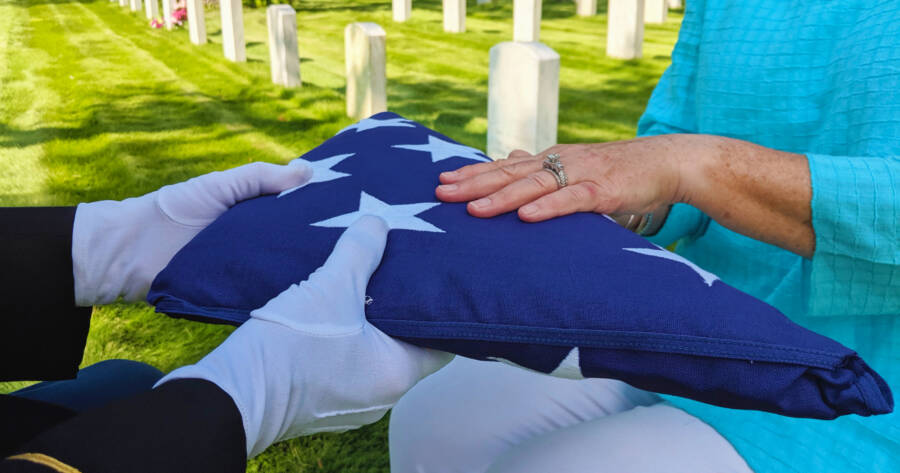- Qualifying military members can set up a Survivor’s Benefit Plan (SBP) upon retirement.
- The SBP, along with standard Social Security, can be used by a widow to stay financially afloat.
- Both the deceased veteran and the surviving spouse must meet certain conditions to qualify for a SPB.
- The payment amount depends on a number of factors, including number of dependents.
One of the primary concerns of the U.S. military is ensuring financial security for service members and their dependents. Lots of benefits and coverages are part and parcel of being a soldier for the U.S. military. A widow’s pension, also known as survivor’s benefit, is one of the more significant veteran affairs benefits.
Due to the nature of service deployment, the U.S. military ensures widows have financial coverage as part of their survivor’s benefits program. However, there are certain terms, conditions, and situations that need to be present for widow’s pension to kick in.
What Are Survivor’s Benefit?
Upon retirement, service veterans are given monthly compensation known as retirement pay. This pay often constitutes about 50 percent of their base pay during active service. When a veteran passes away, their retirement pay naturally stops. That can often mean their dependents are left without a substantial source of income.
During military discharge, service members often take steps to safeguard dependents from this happening. They use a program known as the Survivor’s Benefit Plan (SBP). A SBP is a tax-free benefit to ensure a monthly annuity is given to dependents upon the death of a veteran. It can also be used to provide income at the end of their retirement pay. The annuity, which constitutes a portion of the veteran’s retirement pay, is only paid only to eligible survivors and beneficiaries. Most commonly, that will be spouses and/or children.
 Shutterstock
ShutterstockSurvivor’s Benefit for Widows
Widows are one of the primary beneficiaries of survivor’s benefit. A widow may receive a sizable portion of their deceased spouse’s retirement pay. However, the following determinants need to be met by both the veteran and surviving spouse.
The Veteran
To meet the military service requirement needed to have an SBP, wartime service is mandatory. That means they must have served in some capacity in active combat.
For veterans who served before September 7, 1980, at least 90 days of active service is required. A minimum of one of those days must have been served during a recognized wartime period.
Alternatively, a veteran could qualify for SBP if he enlisted after September 7, 1980 and had active service for at least 24 months. Alternatively, they can qualify by serving the full period of their deployment (with a minimum of one of those days served during a recognized wartime period).
Discharge Requirements
A dishonorable discharge or “other than honorable discharge” is the dismissal of a service member from the military due to immoral or criminal actions. This will disqualify the service member from qualifying for a SBP.
A dishonorable discharge actually strips an officer of just about all the benefits they acquired during their military career — regardless of past achievements or services. It also denies them the privilege of retirement pay and consequently a SBP. This means a survivor will only get a widow’s pension if the veteran was dismissed under honorable circumstances.
 Shutterstock
ShutterstockThe Spouse
There are additional requirements that the surviving spouse must meet, in order to qualify for SBP payments. For starters, the spouse must not be remarried. A surviving spouse only qualifies for a widow’s pension if they remain un-remarried following the death of the veteran.
A SBP aims to ensure financial security for the widow of veteran soldiers. As such, payment of survivor’s benefit is terminated by law if the survivor remarries into a new home. The termination happens regardless of age, and remains even if the remarriage is later terminated by divorce or death.
The Spouse’s Income Is Below a Certain Limit
A surviving spouse is only eligible to collect the maximum amount of widow’s pension (55 percent of the veteran’s retirement pay) if your monthly income is below a certain amount, determined by law. That income includes your base salary, investments, and income from dependents.
The current income limit to be eligible for the maximum survivor’s benefit is $9,344 annually. That amount is for a spouse with no dependent children. The limit rises to $12,229 for a spouse with a dependent child. The amount rises another $2,382 for every additional child.
Adjustments
Survivor’s pension benefit rates are adjusted yearly for inflation and cost of living. A spouse (with no dependents) earning above $9,344 will see their widow’s pension reduced in accordance with the current benefit rates.
A surviving spouse can be disqualified from receiving a widow’s pension altogether if they have a net worth greater than $130,773. You should note that if a married veteran declines a SBP at the time of retirement, they will be unable to cover their spouse (or any future spouse) at a later date.
 Shutterstock
ShutterstockSocial Security Survivor’s Pension
A widow’s pension upon the death of their spouse is often also made up of Social Security benefits, in addition to her SBP. However, a survivor’s pension from Social Security works a little differently than a SBP.
For starters, a widow can only start collecting Social Security benefits after the age of 60 (or 50, in cases of disability). The rate usually ranges from 71.5 percent to 100 percent of the deceased spouse’s benefit, depending on the age of the survivor.
Exceptions
The only exception to this rule is if the widow is not re-married and is caring for a child aged 16 or under (or a disabled child). In this case, they qualify for Social Security benefits regardless of the minimum age. They are entitled to at least 75 percent of their deceased spouse’s Social Security payout.
Eligibility for Social Security survivor’s pension ceases for a widow who marries before the age of 60. However, eligibility resumes if the later marriage ends.
 Shutterstock
ShutterstockGetting Remarried
If you remarry after the age of 60, your marriage will not impact your eligibility for Social Security coverage. You will continue to receive survivor’s pension. However, if you qualify for a pension on your own accord, Social Security will only pay you the higher benefit between yours and that of your deceased spouse. Also, the divorced spouse of a deceased service member receives the same benefits as the widow if they were married for 10 years or more. The benefit given to the divorced spouse won’t affect the amount given to the widow or other survivors.
If the divorced spouse is caring for the legal child of the deceased aged under 16, they will receive survivor’s pension regardless of the length of marriage rule.
How Much Will I Earn in Social Security Coverage?
A widow qualifies for the full amount of the deceased Social Security benefit when she reaches retirement age (usually 70).
Widows between 60 and 70 qualify for 71.5 to 99 percent of the benefit, depending on circumstances. Widows aged 50 to 60 collecting benefits due to disability get 71.5 percent of the benefit. Additionally, widows of any age caring for a child under 16 (or disabled) get 75 percent of the benefit.
 Shutterstock
ShutterstockThe Bottom Line
Survivor’s pensions and benefits are an important part of both Veteran Affairs and Social Security. It ensures the dependents of loyal service members are financially covered in the event of their death. Survivor’s benefits could be the difference between a comfortable life or struggling to get by. Therefore, it’s important that widows (or surviving children) stay on top of their benefit situation. Make sure to apply for both SBP and Social Security coverage, if you are eligible.








